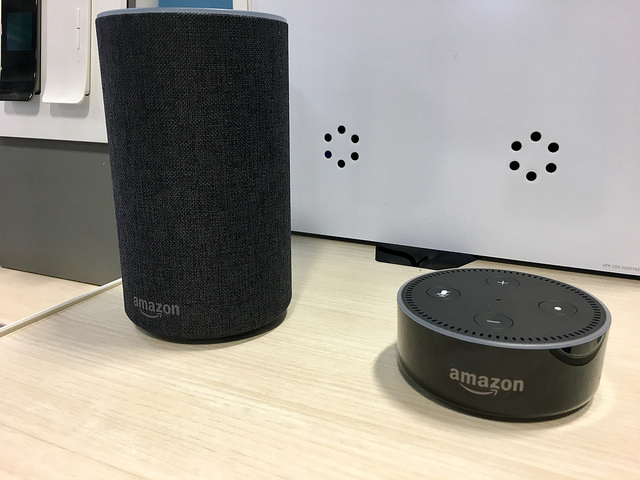
Image source: Best AI Assistant via Flickr
Smart speakers and their personal assistants are in the process of changing brands’ relationships with consumers – and maybe not in a good way.
Most consumers now typically use smart speakers to play music, check the weather, or set a timer or alarm. Mostly, they ask questions. Only about 2 percent of consumes use smart speakers daily to complete a purchase, and only 26 percent have ever bought something through the devices, according to the Voicebot Smart Speaker Consumer Adoption Report.
A Retail Revolution
That will soon change. OC&C Strategy Consultants forecasts that voice shopping will leap from $2 billion to more than $40 billion by 2022. “The retail revolution that is shifting sales from stores to laptops to smartphones could be on the verge of its next sea change — when shoppers will ask Amazon’s Alexa, and other voice-driven speakers, to order just about everything,” its report states. Certainly, Amazon must have had ordering in mind when it developed the Echo voice-enabled speaker and Alexa voice assistant.
Even though completing purchases represents just a small portion of smart speaker requests, brands don’t have until 2022 to develop voice marketing strategies. Besides playing music, smart speakers already play a significant role in the buyer’s journey.
More than half of consumers have researched products with smart speakers, and nearly a third have used them to track their packages, according to the Narvar. Many have also added products to a shopping list, provided ratings or reviews and contacted customer support. As more consumers buy devices for their living rooms, kitchens and bedrooms, they’ll spend more time shopping with their voices.
Far-Reaching Effects of AI
“The effects on the business landscape will be far-reaching,” writes Niraj Dawar, a professor of marketing at the Ivey Business School in Canada, in Harvard Business Review. “All consumer-facing firms can expect AI platforms to radically alter their relationships with customers.”
About a dozen AI assistants now compete in the nascent AI industry. While Amazon Echo dominates the voice-enabled speaker market, its user share is slowly shrinking as Google Home and smaller rivals gain ground, eMarketer reports.
Many marketing experts predict a shake-out and expect only a few major players to dominate the niche. They’ll wield incredible power. Brands will shift their focus from direct relationships with consumers to optimizing their positions on AI platforms, Dawar predicts.
PR and marketing veteran Scott Monty calls Amazon Echo an invisible killer of consumer packaged goods. Unless consumers request a specific brand, Amazon Echo recommends products to them – often one of its Amazon Choice items. “That’s exactly what it is: Amazon’s choice! Not yours,” Monty writes in his blog. “When you surrender your products to third party services, you are at their mercy.”
Monty urges brands to strive to make the processes and selections with voice-activated services as simple and easy as possible. “Less is more. But at the same time, brands need to fundamentally re-think their relationship with customers and with third-party distribution and sales platforms,” he says. Both PR and marketing must position the organization’s brands so that they emerge at the top of responses to voice queries and commands. Voice responses may offer no second choice. Brands may have to strike special reseller deals with Amazon, Google and other voice assistants to become the top result in their category.
Developing Alexa Skills, or apps, is essential for effective voice marketing, experts say. Financial institutions can develop skills to help customers improve money management. The travel industry can help consumers book flights or get car service. Food brands can offer cooking instructions. The risk is that brands may release deficient apps that annoy consumers and damage their reputations. Nonetheless, becoming entwined with the voice assistants is rapidly becoming the new must-have of marketing and PR.
Bottom Line: Smart speakers and their personal assistants will soon become mainstream marketing channels. Leading smart speaker producers may control relationships with consumers. Brands will need to revamp marketing and PR strategies to reach customers who order by voice through smart speakers.
William J. Comcowich founded and served as CEO of CyberAlert LLC, the predecessor of Glean.info. He is currently serving as Interim CEO and member of the Board of Directors. Glean.info provides customized media monitoring, media measurement and analytics solutions across all types of traditional and social media.




